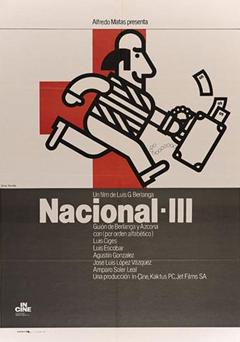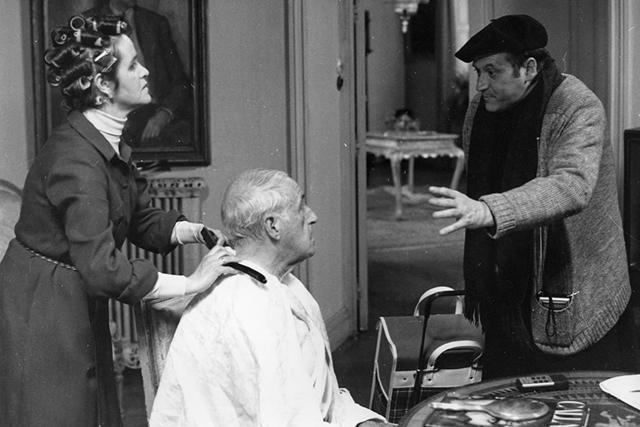National III

After having to sell his palace, the Marquess of Leguineche moves to a flat with his son Luis José, his faithful servants, Segundo and Viti, who are now married, and Father Calvo. In February 1981, when the failed coup d’état takes place, Luis José learns about Chus’s father’s death. Chus and Luis José have been separated for a while now. So, the Leguineches and their entourage travel to Extremadura, where the deceased had his estate, to attend the funeral and to encourage the troubled couple to get back together because Chus is the sole heiress of a fortune which could take both the Marquess and his son out of poverty. Once they achieve their objective, the couple sell all the properties, move back to Madrid and start an odyssey to try and hide all the money made from the sale to France.
After several failed attempts, they decide to do it themselves. They create a pantomime which consists of putting a plaster on Luis José, with the money and the family jewels inside, and including him in a group of pilgrims travelling to Lourdes. After encountering some problems, the Leguineches finally achieve their objective and settle in Biarritz. However, the situation gets worse for the Marquess and his family when the socialist party wins the election in France. This event will prompt the start of yet another evasion operation, this time towards Miami.
En palabras de Berlanga
Production: Kaktus Producciones Cinematográficas, S.A. (Madrid) – In-Cine Compañía Industria Cinematográfica, S.A. (Madrid) – Jet Films, S.A. (Barcelona).
Director: Luis García Berlanga.
Story and Screenplay: Luis García Berlanga and Rafael Azcona.
Director of Photography: Carlos Suárez (Eastmancolor).
Editor: José Luis Matesanz.
Set Decoration and Costumes: Román Arango and Pin Morales.
Executive Producers: Alfredo Matas and Helena Matas.
Production Manager: José Manuel M. Herrero.
Production Chief: Marisol Carnicero.
Assistant Director: Miguel Ángel Gil. Second Assistant Director: José Luis Escolar. Continuity: Raimundo García. Second Cameraman: Alfredo F. Mayo. Assistant Camera: Pedro Fernández Vara. Still photographer: Laureano López. Production Assistant: Luis Briales. Unit Production Manager: Juan de la Flor. Make-up Artist: José Antonio Sánchez. Hair Stylist: Paquita Núñez. Assistant Make-up Artist: José Quetglas. Sound Engineer: José Nogueira. Laboratory Sound Engineer: Francisco Péramos. Assistant Editor: Claudio García. Second Assistant Editor: Lucio Cortés. Second Assistant Camera: Gonzalo Asensio. Tailor: Mª Teresa García Trueba. Amparo Soler Leal Costumes: Dafnis. Steadicam Operator: Alfredo Mayo. Cameras: Camararent, S.A. Credits: Story Film-Pablo Núñez. Props: Mateos-Luna-Mengibar. Costume Design: Cornejo. Upholstery: Emilio Ardura. Gardening: F. Alonso. Electrical Equipment and Material: Ricardo Arenas. Set Constructor: Francisco Prosper. Sound Studios: Tecnison, S.A. Laboratory: Madrid Film, S.A. (Madrid).
Cast
Luis Escobar (Marquess of Leguineche), José Luis López Vázquez (Luis José), Amparo Soler Leal (Chus), Agustín González (Father Calvo), Luis Ciges (Segundo), José Luis de Villalonga (Álvaro), Chus Lampreave (Viti, the housekeeper), María Luisa Ponte (Paulita), Roberto Camardiel (uncle Román), Carmen Carbonell (aunt Piedita), Mabel Escaño (Emilia), Francisco Merino (messenger), Ángel Álvarez (porter), Xavier Domingo (cooking teacher), Florentino Soria (Pacheco), Francisco Llinás (film buff on the train #1), Julio Pérez Perucha (film buff on the train #2), Elena Santonja (course student), Jesús Enguita, María Vico, Conchita Rabal, Julián Argudo, Óscar San Juan, José Vicente Puente, Gregorio de la Peña
Awards
Filming Location
Madrid, Quintanar de la Orden (Madrid), Ciudad Real, Extremadura and Biarritz (France).
More information
Release Date: 6 December 1982.
Designated as Special Quality.



















